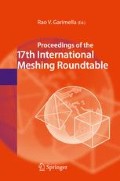Summary
Our final goal is to automatically generate a block decomposition of a given domain without previously meshing its boundary. To this end, we propose to obtain directly a valid dual arrangement that leads to a block mesh. In particular, we introduce a tool based on the new concept of local dual contributions. That is, given a domain we first generate a reference mesh composed by simplices, triangles in 2D and tetrahedra in 3D. Then, we add local dual contributions in the elements of a reference mesh to describe a valid dual arrangement. These local dual contributions are added according to a set of hierarchical rules to ensure the correct matching of adjacent contributions. The first implementation of the tool has been successfully applied to the block decomposition of several geometries, ranging from convex and non-convex domains to geometries with holes. Further research is under way in order to extend the applicability of the presented tool to more complicated geometries.
This work was partially sponsored by the Spanish Ministerio de Educación y Ciencia under grants DPI2007-62395 and BIA2007-66965.
Access this chapter
Tax calculation will be finalised at checkout
Purchases are for personal use only
Preview
Unable to display preview. Download preview PDF.
References
Owen, S.J.: A survey fo unstructured mesh generation technology. In: 7th International Meshing Roundtable, pp. 239–267 (1998)
Baker, T.J.: Mesh generation: Art or science? Progress in Aerospace Sciences 41(1), 29–63 (2005)
Benzley, S., Perry, E., Merkley, K., Clark, B., Sjaardema, G.: A comparison of all-hexahedral and all-tetrahedral finite element meshes for elastic and elasto-plastic analysis. In: 4th International Meshing Roundtable, pp. 179–191 (1995)
Cifuentes, A.O., Kalbag, A.: A performance study of tetrahedral and hexahedral elements in 3-d finite element structural analysis. Finite Elements in Analysis and Design 12(3-4), 313–318 (1992)
Blacker, T.: Automated conformal hexahedral meshing constraints, challenges and opportunities. Engineering with Computers 17(3), 201–210 (2001)
Tautges, T.J.: The generation of hexahedral meshes for assembly geometry: survey and progress. International Journal for Numerical Methods in Engineering 50(12), 2617–2642 (2001)
Tautges, T.J., Blacker, T., Mitchell, S.A.: The whisker weaving algorithm: A connectivity-based method for constructing all-hexahedral finite element meshes. International Journal for Numerical Methods in Engineering 39(19), 3327–3350 (1996)
Folwell, N.T., Mitchell, S.A.: Reliable whisker weaving via curve contraction. Engineering with Computers 15(3), 292–302 (1999)
Mueller-Hannemann, M.: Hexahedral mesh generation by successive dual cycle elimination. Engineering with Computers 15(3), 269–279 (1999)
Calvo, N.A., Idelsohn, S.R.: All-hexahedral element meshing: Generation of the dual mesh by recurrent subdivision. Computer Methods in Applied Mechanics and Engineering 182(3-4), 371–378 (2000)
Murdoch, P., Benzley, S., Blacker, T., Mitchell, S.A.: The spatial twist continuum: A connectivity based method for representing all-hexahedral finite element meshes. Finite Elements in Analysis and Design 28(2), 137–149 (1997)
Calvo, N.A.: Generación de mallas tridimensionales por métodos duales. PhD thesis, Facultad de Ingeniería y Ciencias Hídricas (2005)
Thurston, W.: Hexahedral decomposition of polyhedra, http://www.ics.uci.edu/~eppstein/gina/Thurston-hexahedra
Mitchell, S.A.: A characterization of the quadrilateral meshes of a surface which admit a compatible hexahedral mesh of enclosed volume. In: Puech, C., Reischuk, R. (eds.) STACS 1996. LNCS, vol. 1046, pp. 465–478. Springer, Heidelberg (1996)
Blacker, T., Stephenson, M.B.: Paving: A new approach to automated quadrilateral mesh generation. International Journal for Numerical Methods in Engineering 32(4), 811–847 (1991)
Whiteley, M., White, D., Benzley, S., Blacker, T.: Two and three-quarter dimensional meshing facilitators. Engineering with Computers 12, 144–154 (1996)
Ansys. Ansys icem cfd, http://www.ansys.com/products/icemcfd.asp
Program Development Company. Gridpro, http://www.gridpro.com/
Staten, M.L., Owen, S.J., Blacker, T.: Unconstrained paving and plastering: A new idea for all hexahedral mesh generation. In: 14th International Meshing Roundtable (2005)
A quality tetrahedral mesh generator, http://tetgen.berlios.de
Author information
Authors and Affiliations
Editor information
Editors and Affiliations
Rights and permissions
Copyright information
© 2008 Springer-Verlag Berlin Heidelberg
About this paper
Cite this paper
Roca, X., Sarrate, J. (2008). Local Dual Contributions on Simplices: A Tool for Block Meshing. In: Garimella, R.V. (eds) Proceedings of the 17th International Meshing Roundtable. Springer, Berlin, Heidelberg. https://doi.org/10.1007/978-3-540-87921-3_31
Download citation
DOI: https://doi.org/10.1007/978-3-540-87921-3_31
Publisher Name: Springer, Berlin, Heidelberg
Print ISBN: 978-3-540-87920-6
Online ISBN: 978-3-540-87921-3
eBook Packages: EngineeringEngineering (R0)

